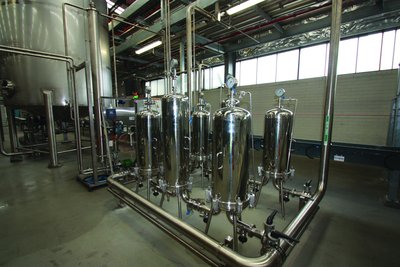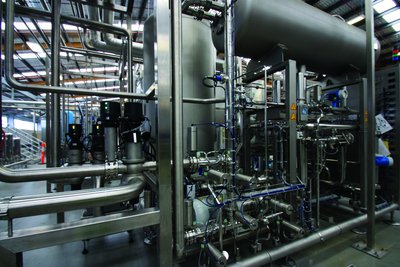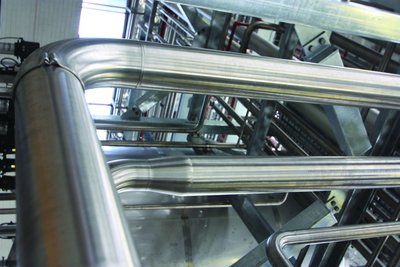Cutting CCA’s carbon footprint
Innovation in process technology and the successful application of stainless steel has led to efficiency gains and sustainable outcomes for one of the world’s most recognised brands in the food and beverage industry.

In 2011, Coca-Cola Amatil (CCA) announced a $450 million investment in PET bottle self-manufacture, or ‘blow-fill’ technology, at its production facilities across Australia, New Zealand, Indonesia, Papua New Guinea and Fiji.
Blow-fill technology is a manufacturing technique that allows companies to produce their own polyethylene terephthalate (PET) bottles within their own facility. It allows manufacturers to form, fill and seal bottles in one continuous process at the one location without human intervention. Blow-fill has enabled CCA to make its PET bottles using significantly less PET resin, resulting in production of the lightest-weight bottles in the global Coca-Cola system.
Previously, CCA would buy blow-moulded bottles from a third-party supplier, transporting them to its own facility to sterilise and fill with product. CCA’s integration of these three steps into one operation has automated its production lines, creating economies of scale and optimising efficiencies of operation.

CCA’s Kewdale facility in Perth is one packaging line that recently completed its installation of blow-fill equipment, procured from Krones AG, a German-based process manufacturer.
CCA engaged ASSDA (Australian Stainless Steel Development Association) member and Accredited Fabricator TFG Pty Ltd for the installation and fabrication of the stainless steel interconnecting pipework for the facility’s new blow-fill equipment.
Sydney-based ME Engineering detailed the scope of works, and coordinated the process engineering and installation of the new equipment.
Over 6 km of 304 and 316L AS1528 standard-grade stainless steel tube was supplied by ASSDA sponsor Prochem Pipeline Products, ranging in size from 25 to 200 mm diameter.

The TFG team purge TIG welded all stainless steel components on-site and internally passivated the stainless steel using citric acid.
ME Engineering’s Project Manager Andrew Meagher said grade 316L was specified for CCA’s Kewdale facility because of the high-chloride content of the water supply in Perth.
With spring water one of CCA’s main products, sanitation is key to avoiding microbiologically influenced corrosion.
Tom Moultrie, General Manager of TFG, said that, while there are other materials that can be specified for equipment using compressed air, stainless steel provides aesthetic appeal, trusted hygiene and longer life span.
The use of stainless steel has been successful in the output of this project, with CCA’s State Projects Engineer Simon Wall stating, “as a beverage manufacturer, food safety aspects of our processes and equipment are critical to ensuring the integrity and quality of our products - an area that stainless steel ensures.”
Kewdale’s new blow-fill line commenced operation in June 2012. It features 14 blowing stations, 108 filling nozzles and 18 capping stations, and has the capacity to produce 26,000 bottles per hour.

Wall said the investment in PET bottle self-manufacture will continue to deliver savings in raw materials - bottles are made using less PET resin and less water is used in the bottling process - and meet future consumer growth and demand.
CCA’s ongoing commitment to innovation and sustainability has maximised production capabilities while minimising the use of resources.
By the end of 2012, 10 blow-fill lines were deployed across CCA’s production facilities in Australia, bringing self-sufficiency to over 70%. Once all 26 production lines are implemented, CCA estimates a saving of 7000 tonnes of PET resin per year, a 15% reduction in bottle weight and 50,000 truck movements eliminated per year. Overall, this is reducing the carbon footprint of every 600 mL bottle by an average of 22%.
This article is featured in issue 52 of Australian Stainless magazine, published by the Australian Stainless Steel Development Association (ASSDA). Images courtesy of TFG Pty Ltd.
Encoders in motion control applications: Noise and signal distortion considerations
To ensure clarity of signal from your encoder, and avoid excessive electrical noise, there are...
Smart, energy-efficient robot grippers cut production costs
Researchers have developed a new type of robot gripper technology that needs 90% less electricity...
Cobots reduce employee lifting by 50%
As one of the world's largest meat producers, Danish Crown faces challenges in handling and...








